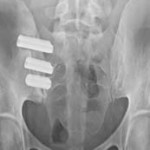A New Minimally Invasive Surgery Option for Treatment of Sacroiliitis
Patients with moderate to severe sacroiliitis who do not respond to conservative sacroiliitis treatments have a new surgical option: Sacroiliac joint fusion, which is an advanced procedure made possible by a new generation of implants and minimally invasive percutaneous techniques.
Sacroiliac joint fusion is suitable as a surgical treatment for degenerative sacroiliitis, inflamed sacroiliac joint dysfunction, iatrogenic instability of the sacroiliac joint, osteitis condensans ilii (OCI), traumatic fracture dislocation of the pelvis, and other causes of sacroiliitis. A new minimally invasive percutaneous technique using radiographic guidance during the procedure gives the enormous advantage of decreasing blood loss, reducing operative time, and preventing extensive surgery.
Here at New Jersey Spine Specialists in Summit, New Jersey, our board certified spine surgeons have performed this minimally invasive surgery with excellent results. The iFuse Implant System, which we employ, provides effective relief of sacroiliitis pain, and provides much faster recovery times and fewer complications than the more traditional open surgical treatments for sacroiliitis, which require more extensive exposures to access the sacroiliac joint.
The iFuse System: Simple and Effective Relief of Sacroiliitis
The iFuse Implant System procedure is performed through an incision which is only 2-3 cm long, and usually requires no more than one hour to complete. The procedure involves inserting three small titanium devices across the sacroiliac (SI) joint and creates a durable construct that stabilizes the joint and provides excellent fixation. This minimally invasive surgical technique is less disruptive and minimizes soft tissue exposure.
During the iFuse procedure, fluoroscopy provides your surgeon with live imaging to ensure proper placement of the biomechanical implants. This procedure is often performed as an outpatient procedure, which allows patients to return home the same day. Postoperatively, patients will ambulate with crutches or a walker with protected weight bearing for six weeks. Following discharge, your surgeon will advise you when it is appropriate to begin a course of physical therapy and when you may resume your normal daily activities.
If your symptoms of sacroiliitis have not responded to conservative treatments, contact New Jersey Spine Specialists to schedule a consultation with one of our orthopedic spine surgeons, and find out if the iFuse minimally invasive sacroiliac spine fusion is a good option for you.









